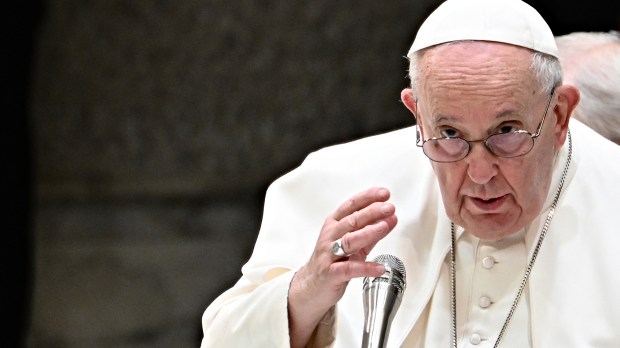Lenten Campaign 2025
This content is free of charge, as are all our articles.
Support us with a donation that is tax-deductible and enable us to continue to reach millions of readers.
Pope Francis says that gender ideology is one of the most dangerous currents in the world today.
The Pope referred to gender ideology, as he often has, as an “ideological colonization.”
Here, the Holy Father takes the concept of colonization as an imposition of an external worldview that destroys a culture or people. This colonization echoes the abuses in the New World and Africa, today imposing “ideologies” on a population.
The Pope spoke of this in an interview with Argentina’s La Nación, aired March 10; it was one of five interviews that were published this weekend in a flurry of attention on the Pope’s 10th anniversary of election.
“Is it true that they’ve asked you to write a document about the theme of gender?” the Pope is asked.
He answered that no one has asked for a document, but they have asked for clarifications. He continued:
“I always distinguish between pastoral ministry toward people who have a diverse sexual orientation and the ideology of gender. They are two different things. Gender ideology, right now, is one of the most dangerous ideological colonizations. It goes beyond sexuality.
Why is it dangerous? Because it dilutes differences, and the richness of men and women and all of humanity is the tension of differences. To grow by way of the tension between differences. The issue of gender goes about diluting differences and making the world the same, blunted, everything identical. And this goes against the human vocation.”
Growing concern
The phrase “ideological colonization” is one that the Pope has used on a number of occasions. He often uses it in reference to family ethics, marriage, and gender issues. And it often comes up in regard to poorer regions of the globe, and the influence wielded by rich countries in offering or withholding financial support depending on if a country bends to pressure on these issues.
In 2015, in a meeting with families in the Philippines, he said:
Let us be on guard against colonization by new ideologies. There are forms of ideological colonization which are out to destroy the family. They are not born of dreams, of prayers, of closeness to God or the mission which God gave us; they come from without, and for that reason I am saying that they are forms of colonization. Let’s not lose the freedom of the mission which God has given us, the mission of the family. Just as our peoples, at a certain moment of their history, were mature enough to say “no” to all forms of political colonization, so too in our families we need to be very wise, very shrewd, very strong, in order to say “no” to all attempts at an ideological colonization of our families. We need to ask Saint Joseph, the friend of the angel, to send us the inspiration to know when we can say “yes” and when we have to say “no”. […] While all too many people live in dire poverty, others are caught up in materialism and lifestyles which are destructive of family life and the most basic demands of Christian morality. These are forms of ideological colonization. The family is also threatened by growing efforts on the part of some to redefine the very institution of marriage, by relativism, by the culture of the ephemeral, by a lack of openness to life.
That same year, to the bishops of Central African Republic, he said, “I cannot but encourage you to give marriage all the pastoral care and attention it deserves, and not to be discouraged in face of resistance caused by cultural traditions, human weakness or the new ideological colonizationthat is spreading everywhere.”
In 2016, meeting with bishops of Poland, he said:
In Europe, America, Latin America, Africa, and in some countries of Asia, there are genuine forms of ideological colonization taking place. And one of these – I will call it clearly by its name – is [the ideology of] “gender.” Today children – children! – are taught in school that everyone can choose his or her sex. Why are they teaching this? Because the books are provided by the persons and institutions that give you money. These forms of ideological colonization are also supported by influential countries. And this terrible!
In 2016, returning from Azerbaijan and Georgia, the pope was asked to speak about transgenderism. Giving the example of comments made by a 10-year-old boy, the Pope said, “It is one thing if a person has this tendency, this option; some people even change sex. But it is another thing to teach this in schools, in order to change people’s way of thinking. I call this ‘ideological colonization.’”
In 2017, on the feast of Our Lady of Guadalupe, he invited, “let us see the richness and cultural diversity of our peoples of Latin America and the Caribbean; it is a sign of the great richness that we are invited not only to cultivate, but also, especially in our time, to courageously defend from every attempt at homogenization which ends by imposing — with attractive slogans — a single way of thinking, of being, of feeling, of living; that ends by rendering pointless and barren what we inherited from our forebears; that results in making people — especially our young people — feel inadequate because they belong to this or that other culture. Ultimately, our fruitfulness demands that we protect our peoples from an ideological colonization that erases what is richest in them, be they indigenous, Afro-American, of mixed race, farmers, or residents of the periphery.
Returning from Panama in 2019, he spoke of sex education being affected by this colonization: “Objective sex education should be offered [in schools], as is, without ideological colonization. Because if sex education steeped in ideological colonization is taught in schools, it destroys the person.”




